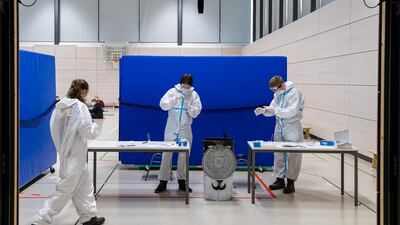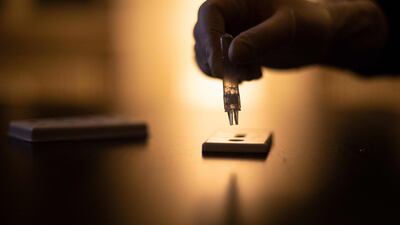France has entered a third wave of the Covid-19 pandemic and additional restrictions must be introduced, French Prime Minister Jean Castex said.
France is grappling with a steady increase in the number of new cases, leading to a heavy strain on the hospital system, especially in the capital, where infections have surged.
On Tuesday, the seven-day average of new cases rose above 25,000 for the first time since November 20.
Health authorities reported 29,975 new cases nationwide on Tuesday, a 4.5 per cent weekly jump, the sharpest in a month and a half. The number of people who died rose by 408, to 91,170.
"It seems to me that the time has come to consider new measures in the greater Paris region," Mr Castex said.
He said weekend lockdowns such as those already in place in two other regions were among measures to be considered for the greater Paris region.
"There is no reason why we shouldn't do in one region what we are doing in another," he said.
He told parliament: “We are in a sort of third wave of the epidemic, characterised by numerous variants.”
Like other EU countries, France lags far behind the United States and Britain in vaccinating its population.
The coronavirus situation is worsening in the greater Paris region where hospitals are under immense strain, the director general of the AP-HP Paris hospitals organisation, Martin Hirsch, said on Wednesday.
Mr Hirsch told RTL radio there were two options to contain the disease – a local weekend lockdown, already in place in other parts of the country, or a broader lockdown in the region.
"The virus is not under control. There are as many patients in intensive care units today as there were at the peak of the second wave," he said.
This week, President Emmanuel Macron said a new lockdown could be introduced within days.
The president still hopes a vaccination drive can stave off the effects of a new pandemic wave triggered by more contagious variants and prevent France from resorting to a third national lockdown.
But suspension of the use of the AstraZeneca vaccine, announced on Monday over safety concerns, could jeopardise the strategy.
Mr Castex said he was ready to get the AstraZeneca vaccine if European health authorities confirmed its safety and it was indicated that France was ready to lift the suspensions.
The European Medicines Agency reiterated on Tuesday that there was "no indication" the shot raised the risk of blood clotting after more than a dozen EU states suspended use of the drug until investigations are concluded.
AstraZeneca said there was no cause for concern and that proportionally fewer thrombosis cases were reported in immunised people than among the general population.
With 4.11 million people infected since the start of the outbreak, France has the sixth highest case count in the world.
Health officials said on Tuesday that a new coronavirus variant sweeping through north-west France could evade detection in standard tests.
The variant, first spotted in Brittany, “doesn’t suggest either increased severity or increased transmissibility” but there are indications its presence in patients is harder to confirm.
Brittany's health workers are trying to establish the extent of the variant's circulation as French authorities fear a third wave of the pandemic has arrived.
“An evaluation is under way to assess the possible impact of these genetic modifications ... on a lack of recognition by virological tests leading to an underdiagnosis,” the general directorate of health said.
The World Health Organisation confirmed it was investigating the variant because of its apparent ability to evade detection in people who had PCR tests.
Eight people were identified in the town of Lannion as carriers of the variant in a cluster of 79 cases.
Pierre Tattevin, professor of infectious diseases at the University of Rennes, said that in addition to these eight cases, there were “several dozen over the past few weeks”.
The incidence of the coronavirus in Brittany has risen steadily for about six weeks and is now at 133 cases per 100,000 people.













